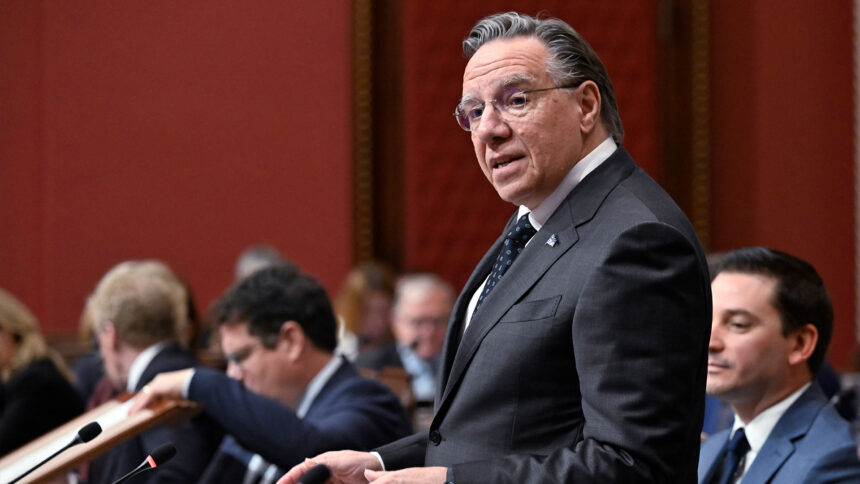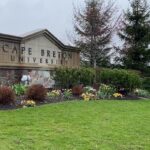As Quebec’s Coalition Avenir Québec (CAQ) government attempts to create a constitution for the province, Indigenous leaders and legal experts say the proposed law is doomed to failure. Innu lawyer Nadir André says seemingly minor issues within the text of the draft constitution could be its legal undoing. André, originally from Matimekush Lac-John in northern Quebec, says Section 23 of the proposed law, which says, “the territory of Québec is indivisible. Its boundaries cannot be altered except with the consent of the National Assembly,” won’t pass a legal test. Each of the 11 Indigenous Peoples in Quebec, André argues, has its own ancestral territory and has the same rights to self-determination under law as other peoples around the world. The Canadian constitution, André says, doesn’t guarantee provinces’ territorial integrity and indivisibility. “[The draft] Quebec constitution pushes it much further than the intent of the Canadian constitution with regards to the boundaries of a province,” André explained. The government of Premier François Legault tabled its draft constitution on Oct. 9. The document follows on the Report of the Advisory Committee on Quebec’s Constitutional Issues within the Canadian Federation, tabled in late 2024, which urged Quebec to develop its own constitution to validate its autonomy in Canada. The report suggested a constitution would strengthen Quebec by laying out the distinct laws, values and legal decisions that have shaped the province as a society. Quebec’s ruling Coalition Avenir Québec party tabled a draft Quebec constitution on October 9. Image: APTN Indigenous leaders rejected the proposed “law of laws” outright. In August, as the proposed constitution was still being drafted, Grand Chief Cody Diabo of the Mohawk Council of Kahnawake said he met with Justice Minister Simon-Jolin Barrette to give his opinion. “There is no Quebec nation,” Diabo told APTN News in August. “[Jolin-Barrette is] a Canadian at the end of the day. […] Our agreements are with the British Crown, who delegated that to the federal government, and [Legault and the CAQ] are just the provincial government. “This whole notion that they’re trying to create a constitution, to me, is ridiculous.” Since the tabling of Bill 1, Québec Constitution Act, 2025, Indigenous opposition has grown, particularly among those who noted that First Nations and “Indigenous nations of Quebec” are only mentioned three times in the document, in its very beginning. Read more: ‘There is no Quebec nation’: Grand Chief delivers stern message to Quebec’s Justice Minister The Assembly of First Nations Quebec-Labrador has called for the Legault government to consult with all 42 Nations in Quebec. Individual First Nations leaders have assailed the constitutional project, notably Grand Chief Pierre Picard of the Wendat Nation, Chief Jean-Charles Piétacho of the Innu Council of Ekuanitshit and Chief Sipi Flamand of the Atikamekw Council of Manawan. “[The draft constitution] completely denies the rights and place of Indigenous peoples in Quebec,” Flamand told APTN. “What’s more, it is prepared to redefine a new regime without taking into account our existence in relation to our rights, which are protected by section 35 of the Constitution Act, 1982.” Flamand cited the minimal mention of Indigenous rights in the preamble to the draft constitution itself, which he described as “almost decorative.” “The rights of Indigenous peoples cannot be treated as a footnote in a draft constitution,” Flamand said. “They must be enshrined and recognized in a substantive manner when they stem from an existing constitutional obligation and also from international commitments, such as the United Nations Declaration on the Rights of Indigenous Peoples.” In the aftermath of many Indigenous leaders’ summer-long battle with the CAQ over the government’s since-retracted bill to modernize forestry, Flamand said he feels the Quebec government is still trying to govern unilaterally, without participation by and involvement of First Nations. “I would say that it is outright systemic racism on the part of the CAQ government toward First Nations,” he said. “Quebec is acting as if First Nations do not exist. This is yet another colonial attitude that perpetuates exclusion.” “Nations” but not “people” André told APTN that this attempt to close off discussions of Indigenous people’s claims to territory within the province is connected to the draft constitution’s unwillingness to place First Peoples on an equal footing with Quebeckers. “In the [draft] constitution, Quebec qualifies itself as ‘a people’ and as ‘a nation,’” he explained, “yet only qualifies Indigenous people as ‘nations.’ Quebec does not use the term ‘people,’ even though section 35 of the Canadian constitution refers to Aboriginal ‘people.’ Is that done on purpose? “Why wouldn’t Quebec at the very least state that Indigenous people are ‘people’ and ‘nations’?” André pointed out that Indigenous people are not Quebeckers, but the draft constitution appears to suggest all those living inside the Quebec territory are Quebeckers by definition. He called that “a false assumption.” “Now, that territory is what is not clearly defined,” André said. “So Quebec says, very simple, ‘The territory of Quebec is the current territory of the province.’ And this is not a settled issue. Far from it.” Another key sticking point for André is the argument that French-speaking Quebeckers have been “colonized” by English Canada and must defend themselves collectively, at the same time as the Quebec government refuses to recognize the UN Declaration on the Rights of Indigenous Peoples. André argued the Legault government “missed a huge opportunity to show good faith […] by preaching by example, by acknowledging that there are other people living [on the territory] with them and [Quebec] will recognize their rights. What a good way to introduce the fact that [French-speaking Quebeckers] also need to be acknowledged and protected with collective rights.” André said, for much of its history, Quebec has refused to acknowledge the existence of Aboriginal title. However, two critical decisions in 1973 forced the province’s hand. Both Quebec Superior Court Justice Albert Malouf’s decision to grant an injunction to Crees and Inuit stopping work on the James Bay Hydroelectric Project, and the Supreme Court of Canada decision in Calder et al. v. Attorney-General of British Columbia, acknowledged the existence of Aboriginal title. In the Supreme Court decision, André explained, two facts confirmed the validity of Aboriginal title. The first was that Indigenous people lived in organized societies as sovereign nations prior to the arrival of Europeans. The second was that the Royal Proclamation of 1763 made it impossible to acquire Indigenous land without the consent of the people, unless the people themselves transferred their title to the Crown. An image of the Royal Proclamation taken at Archives Canada. Photo: APTN. Though many Quebec political leaders opposed the Royal Proclamation from the beginning and continued to do so for more than 200 years, André said that did nothing to change the fact that it was never repealed or replaced. It was only in 1973 that the Calder case with the Supreme Court of Canada affirmed that Aboriginal title existed. “It is still the law that if you did not extinguish title, if the Indigenous people did not transfer their title to the crown, then they still have title,” he explained. “So for Indigenous people, the Royal Proclamation is not only still relevant, but it’s still fundamental.” All that bodes poorly for the draft Quebec constitution, André said, as it strips from Quebec any capacity to ignore Indigenous title, which is still currently in force with all Indigenous peoples in the province who haven’t signed treaties. Any attempt to assert the idea of a fixed and indivisible territory could be undone simply by that recognition of Indigenous title. André thinks the draft constitution would be a hard document to defend in court. He wonders whether the AFNQL, the Mohawk Council of Kahnawake or any other First Nation or Indigenous organization is planning a legal challenge to the draft constitution. Flamand wonders the same. “We hope that other Indigenous leaders will take a position on this bill,” he said. “We are calling for a genuine nation-to-nation dialogue, not a project imposed from above. Our rights are fully protected in the Canadian constitution, and if Quebec goes ahead with its own constitutional bill without involving First Nations and Indigenous peoples, it will be a major breach in its relations with First Nations.” In an email to APTN, the office of Justice Minister Simon Jolin-Barrette said, “The project does not affect or call into question the ancestral rights of Quebec’s Indigenous nations or those arising from treaties. On the contrary, the Constitution recalls in its preamble the importance of Indigenous realities in Quebec. The recognition of the 11 nations in the law of laws reflects Quebec’s commitment to pursuing relations based on mutual respect and nation-to-nation partnership.” APTN contacted the office of Premier François Legault for an interview, but had not heard back by press time. We contacted CAQ Minister of the Family/Minister for the Côte-Nord Kateri Champagne Jourdain, who is Innu and the only Indigenous person sitting in Quebec’s National Assembly, to ask her thoughts on Indigenous criticisms of the draft constitution. Her attachés directed us to speak with the office of Justice Minister Simon Jolin-Barrette, who forwarded the above statement. Continue Reading
Innu lawyer warns Quebec constitution could be undone in court

Leave a Comment










